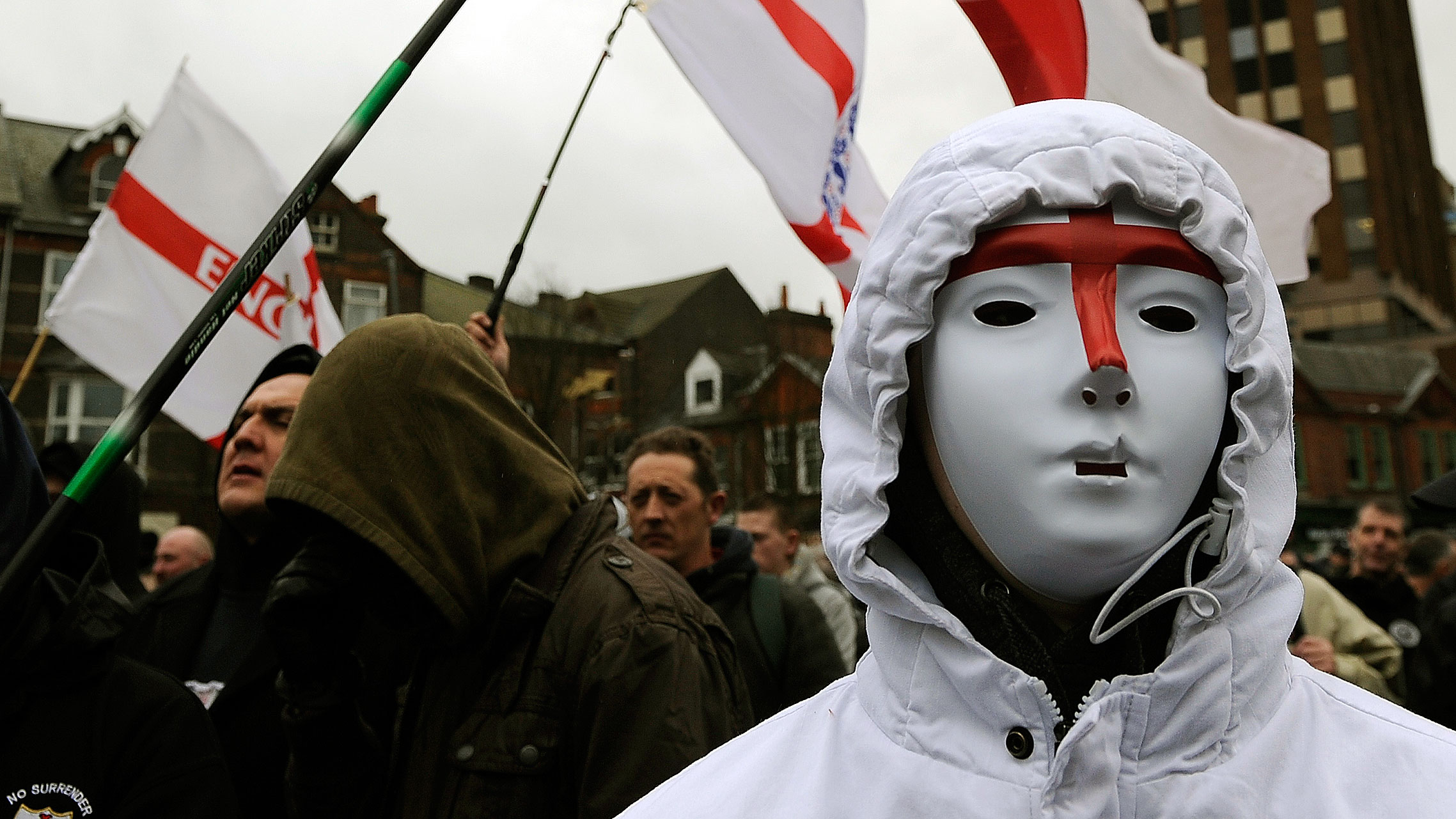Britain’s far right collapses amid infighting and legal woes
The beleaguered English Defence League takes to the streets of Solihull on Saturday. But with its figurehead Tommy Robinson in prison, is Britains far right a spent force?

Britain’s far right suffered a series of embarrassing defeats in 2012 and has been left fragmented and disorganised. The BNP lost members and the EDL lost its leadership.
In September 2012 EDL leader Tommy Robinson entered the US illegally, using a friend’s passport, to speak at a conference of anti-Islam activists. This week he was sentenced to 10 months in prison for his actions.
The EDL was symptomatic of something far more dangerous in society and that has not gone away
Matthew Collins, Hope Not Hate
At its height the English Defence League mobilised thousands of protesters across the country, but now the group struggles with infighting and splinter groups and has greatly reduced numbers on the streets. The group came under attack from locals in Walthamstow last October, and an attempt to return to north London a month later was met with a police ban. The protest moved to parliament but drew less than 100 activists.
Despite this, in its short three year life the EDL radicalised thousands of people and brought anti-Islam protests to towns across the country. The group also provided a fertile recruiting ground for more extreme right-wing groups.
Monitoring hate
Matthew Collins, a campaigner with Hope Not Hate and former member of the National Front, has been monitoring the decline of the organised far right but warns that while groups have collapsed, their root causes remain.
“The EDL was symptomatic of something far more dangerous in society and that has not gone away,” he explained.
“They have radicalised thousands of people. These are often people that the police have no knowledge of, the ideas haven’t gone away and there are still networks that survive.”
The far-right’s organisational collapse comes as Europe sees a major surge in support for ultra-nationalist groups with Greece’s Golden Dawn making major electoral gains. A recent far-right demonstration in Warsaw saw 10,000 march through the city, with hooligans battling police. In Hungary the hardline Jobbik party has secured 43 seats in parliament, becoming the third biggest party.
Right-wing groups have been linked to murders in Norway, Germany, Spain, Czech Republic, Italy, Spain, Poland, Russia and Ukraine in recent years. In Germany a neo-Nazi terror cell was found to be operating in the country for years undetected.
Hope Not Hate estimates that there are 20 people currently in prison for planning right-wing acts of terror in the UK, and says there have been nearly 600 arrests linked to the EDL since the group’s inception.
Collins warned of the volatile situation created by the emergence of multiple hardline splinter groups such as Combined Ex-Forces and English Volunteer Force, some of which have abandoned the EDL’s populist stance to openly co-operate with activists from neo-Nazi groups and former members of the National Front.
Griffin losing influence
The BNP has suffered a huge decline over the last year losing prominent activists, a number of whom allied themselves with the EDL in the British Freedom party, whose leader Kevin Carroll is also the current EDL leader. Carroll took 8,675 votes in the police commissioner elections in Bedfordshire but has failed to turn around the EDL’s decline since his close friend Tommy Robinson’s imprisonment.
Relations between far-right groups have been tense, Nick Griffin and Robinson engaged in a war of words in a series of videos posted online. Griffin’s BNP has survived financial difficulties and is now geared for a move away from electoralism as it faces the prospect of losing two of its three remaining councillors. Its vote peaked at over 500,000 in 2010.
Collins explains: “The BNP as a party has survived but electorally they are finished. We are seeing a return to street protests. We will not see another BNP or National Front-style movement, under the Tories electoral chances for these groups are small.”
The English Democrats hope to replace the BNP, and ran a record number of candidates in last year’s local election, many of whom were previously BNP activists. The party managed to hold onto its five deposits in the police and crime commissioner elections, and took second place in South Yorkshire.
The collapse of organised groups can lead to more extreme actions from isolated right-wing extremists. A survey last year revealed that 40 per cent of BNP supporters believe armed conflict between racial groups is justifiable.
The right-wing monitoring group Extremis Project noted that despite record levels of concern over immigration since 2001, the BNP persistently failed to convince most voters. Research has revealed that 11 per cent of people who were aware of the EDL would consider joining the group, with older working class men most likely to support them.